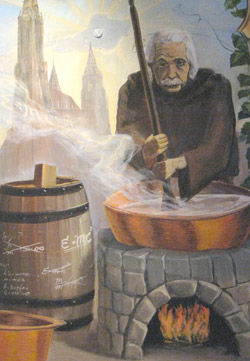Roger Protz has the exclusive: “The (Bass) brewing museum and visitor centre in Burton-on-Trent has been saved and will reopen in 2010, possibly as early as Easter. This major victory is the result of a sustained campaign by beer lovers, brewery workers, the local MP and the Burton daily newspaper.”
Molson Coors had announced it would close the museum and historic brewery.
The key attraction will be a working 30-barrel brewery run by Steve Wellington, who currently runs the on-site White Shield Brewery. Visitors will see beer being made and the brews — all cask-conditioned beers — will go on sale commercially.
Yes, beer makes a beer museum a whole lot cooler.
– The Pittsburgh Tribune-Review reports that Tom Pastorius, founder and former CEO of the Pennsylvania Brewing Co., has been assured a $300,000 loan that will allow him to buy back Penn Brewing.
“I’m very optimistic” the deal to buy the business will be complete in December,” Pastorius said. “We need to brew some beer. Christmas is coming.”
Pastorius sold the business to Birchmere Capital in 2003. Birchmere since closed the brewery — although the equipment is said to be intact inside — and has the brands brewed under contract at the Lion Brewery in Wilkes-Barre.
– This factoid from the St. Louis Post-Dispatch: Budweiser sells for about eight times more than that of local Chinese beers, according to Anheuser-Busch InBev global advertising director Andrew Sneyd. He said one reason may be that the American brand seems to represent the American dream, which resonates with many hard-working and ambitious Chinese consumers.
Provide your own punch line.
 Ron Pattinson started it: “
Ron Pattinson started it: “